Recent Mozambican government forecasts for the country's 2023-2024 rainy season present a challenging scenario for people in northern Mozambique, especially in Cabo Delgado. The National Meteorological Institute predicts above-average rainfall in northern Mozambique for the current rainy season, which began in October and lasts until April 2024. This weather could worsen the public health situation in Cabo Delgado province. It could also contribute to a deterioration in food security for thousands of people with humanitarian agencies running out of funds to provide food aid.
President Filipe Nyusi warned on 4 October of the possibility of extreme natural phenomena, particularly the return of El Niño, which could cause temperatures to rise and rainfall to be higher than normal in northern Mozambique. The effects of El Niño were last seen in Mozambique in 2018-2019, causing intense rainfall across the country. In April 2019, another extreme weather event, Cyclone Kenneth, hit the coast of Cabo Delgado in April, causing more than 40 deaths, and partially or completely damaging more than 35,000 homes.
The authorities claim to be prepared for extreme weather events this rainy season. However, their capacity to mitigate the effects is limited. The National Institute for Disaster Management (INGD) in Cabo Delgado reports that its contingency plan for natural disasters is in need of just over US$1 million. Responding to the impact of the rains will be difficult without these funds.
One of the most significant impacts of the heavy rains has been the spread of cholera. The destruction of sanitation facilities has also contributed to the contamination of many sources of drinking water and food. The Council of Ministers suggests that the number of cases in the provinces of Nampula, Tete, Zambézia, and Cabo Delgado has increased in recent weeks, although no specific figures have been released. However, according to the National Directorate of Public Health, there have been around 2,200 new cases of cholera and six deaths in the past weeks, with the highest incidence in the province of Zambezia, in the central part of the country. Since 14 September 2022, there have been more than 36,000 cases of cholera and around 150 deaths.
In Cabo Delgado, cholera cases have already been recorded this year in the districts of Pemba, Montepuez, Mocímboa da Praia, Mueda, and Chiure. There is an increased risk of cholera outbreaks as people return to their areas of origin. Mocímboa da Praia is a case in point, where poor sanitation, limited health services, water mains, standpipes, and pumps have been vandalized, leading to water shortages and the easier spread of cholera. The government has sent public health brigades to four provinces, including Cabo Delgado, to monitor the cholera situation.
The impact of El Niño on agricultural production is another concern. Local agriculture and fishing provide food for most of Cabo Delgado's population. Heavy rains could cause pests to spread and agricultural land to be destroyed, drastically reducing food availability, in a context where food insecurity is already affecting around 850,000 people. At the time of cyclone Kenneth, 31,300 hectares of agricultural land were flooded by heavy rains, resulting in the loss of tonnes of various food products.
The rainy season could thus exacerbate hunger in Cabo Delgado. With aid dwindling by the day, extreme weather events could push people further into chronic malnutrition and food insecurity. With the distribution of food aid and response to health emergencies already limited by the conflict, extreme weather could also make the distribution of food aid harder with the possible damage of main roads in the province. The government is drawing up an ambitious national plan to mitigate the effects of extreme events, with a budget of more than US$203 million, due to be considered by Mozambique's Council of Ministers soon. However, it is not clear where the funds will come from and whether they will be available to mitigate the effects of the current rainy season.









